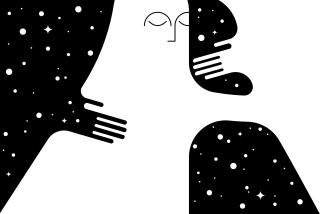Learning to Keep the Mind Open to ESP
- Share via
In 1977, Diane Morissy was a Los Angeles office manager by day and a professional clarinet player by night. Then, she was electrocuted while working on her fish tank and was, by her own account, clinically dead for 23 to 28 minutes.
What she experienced during that period changed her conventional notions about time, consciousness and the power of the mind.
Teaches in Colleges
Shortly after her near-fatal accident, Morissy heard Thelma Moss, a UCLA psychologist who studies parapsychological phenomena. While not academically trained in the field, Morissy has become a recognized expert, working with police to find missing persons, investigating haunted houses with Moss, serving as regional coordinator for the Connecticut University-based International Assn. of Near-Death Studies, appearing on numerous radio and television shows and teaching an extension course entitled “How to Develop Your ESP” at more than 20 colleges scattered throughout California.
Although she readily admits to having extra-sensory perception, Morissy does not think of herself as having an unusual talent. “I believe it is a technique that can be enhanced and developed,” she said. “A lot of people just don’t use it.”
Also hampering the development of ESP by the general public is the discrediting effect of persistent, but groundless, superstitions, such as the notions that things happen in threes.
“People look for that third thing,” she said. “It becomes a self-fulfilling prophesy.”
In her classes, Morissy provides clarvoyance exercises. She tells her students to open a magazine facing away from them and put the open magazine face-down on the floor. She then tells the students to see the unseen picture in their minds.
“Many people are quite good at this, especially with practice,” she said. “But many people are so afraid of being wrong that it hinders their development.”
She also suggests that persons interested in testing or developing their ESP create a set of Zaner cards, a 25-card deck containing five squares, five circles, five plus signs, five sets of wavy lines and five stars. Probability indicates an average score of five correct answers in a 25-card deck.
“If you get 10 or 11 continually, that is an indication of psychic abilities,” she said.
Morissy believes dreams are an important medium from which to receive advice and information from the subconscious. “The best interpreter of a dream is him or herself,” she said. However, people are often unclear about what the symbols in their own dreams mean.
“Some negative-seeming dreams are signals that while you may be going through a rough period in your life, the soul is being cleansed,” she said. Morissy tells her students to read a variety of books on dream interpretation, then settle on the book with which the student feels most comfortable.
Subconscious Mind
She then instructs her students to read the book several times, enough so that the symbols presented in it seep into the subconscious mind. Then, she tells her students to go to sleep thinking about the symbol that best represents the subject on which they want help.
Morissy says after people turn to their dreams for advice over several months and keep a log summarizing them, the content of the dreams will often begin to change. “You have people coming to you (in dreams) saying this is what you should be doing in your physical life,” she said.
Morissy said she does not know how or why ESP exists. She is simply convinced that there are phenomena affecting people that go beyond the five senses.
While she does not know why some people appear to have more aptitude for ESP than others, Morissy said personality profiles of people who do well on psychic ability tests tend to be more extroverted and impulsive than people who score low.
“Participating in life seems to cause more psychic things to happen,” she said.
More to Read
Sign up for Essential California
The most important California stories and recommendations in your inbox every morning.
You may occasionally receive promotional content from the Los Angeles Times.













